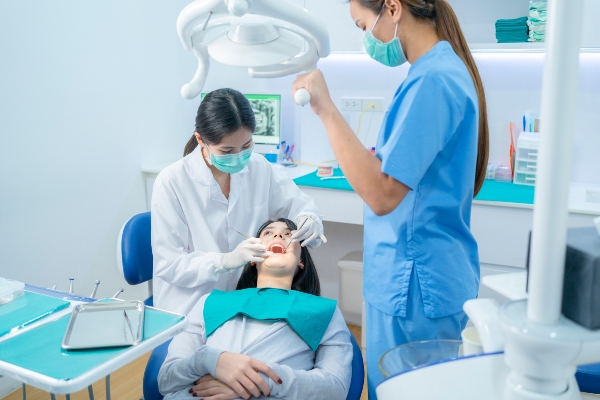A Children’s Dentist Recommends the Age of Your Child’s First Dental Checkup

Your child’s first visit to a children's dentist is an important part of good development. A common question is what the right age is for the first visit. In the past several years, the answer to this question has changed quite a bit. In the past, some children's dentist recommended that age should be around three. But the first visit should actually happen a lot sooner than that.
The right age for a checkup
A children’s dentist will now often recommend that the first visit be as soon as the teeth erupt. That might be around six months to a year old. This is also when parents should switch from cleaning the gums to brushing the teeth. Each child has a different developmental level. But the average age might be around 9 months old.
Some parents might feel that this is a very young age to go to a children’s dentist. Many parents might remember that in the past, the recommendations were around 3 to 5 years old. But more modern research shows that children should have early applications of fluoride done. The research shows that these children are less likely to have cavities.
That is compared with those who come to the dentist at a younger age. Plus, this is a good time to start building strong dental habits for every family member. As the child grows, the child can develop a strong relationship with the dentist. They can have positive memories with the children’s dentist.
A pediatric dentist can also look for potential issues, like thumb-sucking, pacifier use, and tongue thrusting. Plus, the children's dentist will check that the child is meeting vital milestones. The children’s dentist will encourage good nutritional habits, like avoiding sugary foods. That will help both the child’s dental health and overall well-being.
What to expect at a visit
An early exam will focus on having a good relationship with the child in a comfortable place. If the child is old enough, then the dentist will introduce them to different dental elements. That might include the staff members, sunglasses, tooth polisher, and the dentist chair. This will help the child to feel more relaxed when visiting the dentist. The result will be a more positive experience.
Once the child is comfortable, the child will lie on the parent’s lap. Then the children’s dentist will look at the teeth and look for any issues. Fluoride will also likely be applied during this time. The parent might get tips on how to care for the teeth and make the right food choices. Then the young patient will have a schedule for regular dental visits for good oral health.
Benefits of having regular dental checkups with a children’s dentist
It is important to start proper oral hygiene practices early in life. The child can continue these practices until adulthood. It is up to the parents to motivate the child to see the children’s dentist. Below are some of the known benefits of having regular checkups even as a child:
- It helps children develop a positive attitude toward seeing the dentist. The children’s dentist can explain the steps to the child and even incorporate fun activities into the dental checkup. The dental team can play cartoons or nursery rhymes to keep the mood calm and entertaining, especially when there are treatments involved. More frequent dentist visits can make the child used to the presence of the dental team, the clinic, and the instruments. The child will see dental inspections as a natural part of growing up.
- It increases a child’s awareness of good dental care at an early age. A children’s dentist always stresses that it is never too early to start good oral care. Encouraging families to teach children proper oral care as part of daily activities is important. Seeing the dentist regularly can help kids learn the proper brushing and flossing techniques. This can help kids maintain healthy gums and teeth.
- It makes children more aware of regular brushing. The children’s dentist will show the young patient what skipping proper oral care can do to the teeth and gums. Explaining the formation of plaque and tartar can motivate the child to practice oral care every day. This can help prevent the development of severe tooth and gum infections later in life.
Visit a children’s dentist today
A children’s dentist likes to see patients at a young age. This can be a fun appointment for you, your child, and the pediatric dentist. It will set the stage for a healthier mouth for your child. Do not hesitate to make an appointment today.
Request an appointment here: https://www.hvkidsmiles.com or call Hudson Valley Pediatric Dentistry at (845) 363-4177 for an appointment in our Middletown office.
Check out what others are saying about our dental services on Yelp: Children's Dentist in Middletown, NY.
Recent Posts
Cavity treatment for kids is essential for a child’s oral health. Dental decay can cause discomfort, causing the child to lose focus at school. It can even result in low self-esteem and malnutrition. Treating cavities can improve your child’s general health. Here are effective techniques for cavity treatment for kids.There are cases when fillings cannot…
Parents play a crucial role in their children's tooth care by ensuring their children get started on the right path to optimal dental health. This involves overseeing children's tooth care at home while also helping them develop healthy dental habits and ensuring they see a pediatric dentist regularly.Parents will need to keep their child's mouth…
Just like adults, children need preventive dental care — that is where pediatric dentistry comes in. Many parents believe that their child's teeth are healthy simply because their child is young. The truth is that oral health issues are as prevalent in kids as much as adults. Since they love sugary treats, the risk of…
Children have a great deal of growing and changing to do before they come into their adult smile, which often means parents fail to consider cosmetic dentistry for children as an option. However, cosmetic dental services can make a big difference for kids at this vulnerable age, when they may be prone to bullying and…


